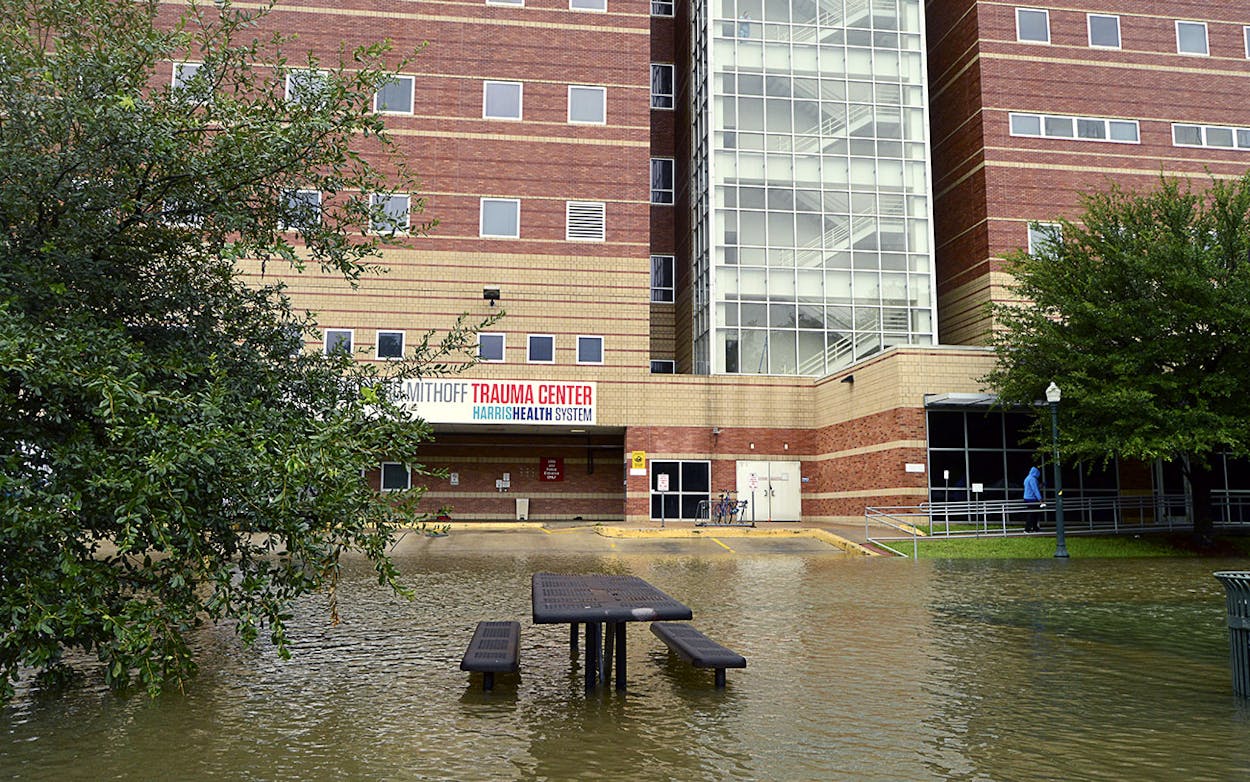Ahead of Hurricane Harvey, Houston’s Texas Medical Center—the largest medical center in the world—took precautions including shelter-in-place policies for essential employees. But when 15 trillion gallons of rain came pouring out of the sky, only that old saw about mice and men applied. “I don’t think anyone planned for the amount of rain, the record-breaking rainfall that has hit Houston,” CEO Bill McKeon told PBS. Although much of the center, which treats ten million patients a year, remained above the flood waters, Harvey rendered it a moat-encircled castle.
Kate Kirkpatrick is a registered nurse at MD Anderson Cancer Center, one of the dozens of hospitals in the Texas Medical Center. As of Wednesday, she had been there around-the-clock since Saturday night. “I worked Friday night so I just finished five shifts in a row and roomed-in for four of those,” she said.
Only one doctor, Sattva S. Neelapu, could make it in safely. Kirkpatrick said Dr. Neelapu walked five miles each way through a downpour to get to MD Anderson. A nurse practitioner whose name she never quite caught—Sue, she thinks—walked just as far through the same deluge. And by Sunday morning, Kirkpatrick said, she and her fellow nurses had to figure out how to take care of the patients on their wing largely on their own.
Still, Kirkpatrick seemed more impressed by the dedication of the kitchen staff.
When MD Anderson went on official “ride out” on Sunday morning, it meant that the staff at the hospital had to stay. So a tiny group—the kitchen crew naturally reaches its lowest number around that time on an average week—was responsible for keeping everyone fed. Kirkpatrick heard that there were as few as three and as many as six feeding one of the world’s largest cancer centers. “These folks fed the entire hospital,” she marveled. “All the patients. All the staff. All the visitors…. Lab techs started helping them. It was amazing what they did.”
And when the in-house patient-kitchen phone system failed, another employee whose name Kirkpatrick did not catch made sure that patient meal requests were delivered to the overworked kitchen, which found a way to fulfill them as best they could. “These people that fed all of us—they never get noticed,” she said.
Up the road at Houston’s Methodist hospital, chaplain Susan Buchanan was humbled and awed by the response of nearby residents. During the worst of the storm, she put out a simple Facebook request to friends who lived nearby in neighborhoods like Southgate and West University Place. She wanted to know if people there could put up staffers who had been worked off their feet after 96 hours at the hospital.
“Within 12 hours, I had 80 people offering everything from med students’ apartments to some of the large and beautiful homes in Southgate and West U,” Buchanan said. “Some of our staff most in need are those who depend on public transportation. We have been able to provide respite for 25 staff members including food service, patient care assistants, and security personnel. I’ve been overwhelmed by the generosity of our neighbors who are willing to take strangers in for the night. They also have brought food for staff, and Chik-fil-A, Jason’s Deli, Brennan’s, and others have also donated.”
But it wasn’t just the neighbors who made her proud:
“So do all of those who work in hospitals who continued to care for patients, even as water was rising in their own homes,” she said.







